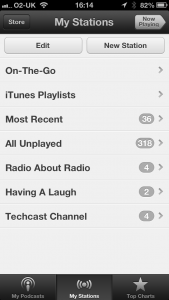One of the most infuriating things about modern smartphones (and, more specifically, the apps that you download to them) is their constant need for love and attention by way of an endless stream of updates. It’s not really a problem the G20 leaders are keeping themselves awake at night thinking about but those little icons drive me insane (and I am fully aware some phones allow apps to automatically update but I refuse to engage in that whole ‘best smartphone platform’ nonsense).
So, yesterday I went through another round of updates. Rarely do I pay attention to the ‘release notes’ given that the usual excuse for consuming the bandwidth is ‘bug fixes’ but, for some reason, I did when it came to Apple’s Podcast app.
Apple more-or-less created mass market demand for podcasts in 2005 by including them in iTunes but, in recent years, the format has appeared to have lacked much attention from them; on i-devices they were spun out of iTunes into their own app a little while ago.
I suspect it’s that lack of love that spurred me into reading the release notes. And, in those notes, the first item read,
“Create custom stations of your favourite podcasts that update automatically with new episodes” [source]

which is accompanied by a lovely image of the ‘My Stations’ screen in the app showing ‘stations’ named ‘Morning Commute’, ‘Kids Shows’ and ‘News’ amongst others (the image here is of my phone, with three customised stations).
Six-or-so months ago I wrote a piece called “It’s My Radio Station” which suggested that, at some future point, I would become my own programme controller by setting some basic rules in an app that mixed music and speech to create a customised radio station (which is wholly different from a customised music stream). I genuinely didn’t think it fanciful then and I think it’s even less so now. Imagine the next iteration of Apple’s app where I can mix an iTunes playlist (from my machine or their rumoured streaming service) with this functionality.
In my earlier piece I suggested the people best placed to develop this are today’s radio stations because they have experience generating the bits between the music (rather than the Spotify-type music-focussed services of this world). So, it’s sort-of encouraging to read that American broadcast giant Clear Channel is trying something along those very lines (of course, I can only report this second-hand not being able to use the iHeartRadio app in the UK). Fool.com reports,
The beauty of Add-Ins is that it’s not just about the local perspective. Add-Ins can be customized. Someone that isn’t hitting the open road may not care about traffic. Someone staying in may not care about the weather. Not everyone cares about local news headlines. [source]
I believe that any radio station with ‘talent’ that is not getting that content out in alternative ways, including some form of regularly updated podcasts (long and short versions), is missing out on a market. More importantly, they’re missing out on an opportunity to learn about how radio will be consumed in the future.
Personalised radio is coming (just as personalised news is already here). I don’t think Apple’s use of the word ‘stations’ can be dismissed but it remains to be seen if it indicates a direction they’re prepared to take. Nonetheless, it could be either new players in the radio space – or an existing broadcaster – who will get there first.
Three things fascinate me about how this plays out. Firstly, will a broadcaster be prepared to take a risk on this kind of development or will it need to come from outside broadcast groups to truly allow people to mix-and-match the content they want? Secondly, given it’s proven people like to time-shift television, is radio content sufficiently compelling and/or useful to put the time-shift effort in? And, thirdly, can audio producers generate a revenue from such personalisation?
Time will tell. But we’re going to rapidly see innovation on this space. I wonder who’ll get left behind?